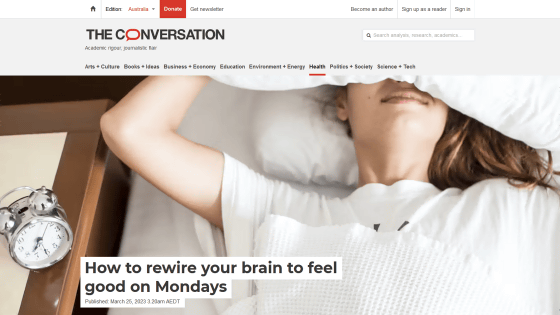How can I change my brain to look forward to Mondays?

There should be many people who say that Mondays after holidays are depressing, but it is not easy to quit work or school just because you hate Mondays, so I would like to be able to look forward to Mondays. Therefore,
How to rewire your brain to feel good on Mondays
https://theconversation.com/how-to-rewire-your-brain-to-feel-good-on-mondays-199236

Leschke points out that the human brain loves ``predictability and routine,'' and that lack of routine is associated with decreased happiness and increased psychological distress. When weekdays turn into weekends, the joy and freedom that vacations bring makes it less difficult to change and adapt to routines, but when weekends become overloaded with work and uncomfortable chores, your brain will struggle. She says she struggles to adapt to her weekday routine.
``One way to adapt to the changes after the weekend is over is to introduce routines that continue throughout the week that make our lives more meaningful,'' says Leschke. In other words, by incorporating a 'fun routine' that continues regardless of whether it is a weekday or a holiday, the switch from holidays to weekdays will be smoother.
For example, doing routines such as ``watching your favorite TV program'', ``gardening'', and ``going to the gym'' at the same time regardless of holidays and weekdays makes it easier to adapt to changes. “Routines improve the sense of consistency, which is the process of understanding complex life events,” Leschke said. If it is established, our lives will be more meaningful.'

Another routine to establish for those who want a smoother transition between holidays and workdays is a 'sleep routine.'
'Changes in sleep patterns over the weekend can cause social jet lag . For example, going to bed later and sleeping longer on holidays than on weekdays can affect your body clock and your social need to wake up,' Leschke said. There may be discrepancies between the times when it is not possible, which is associated with increased stress levels on Monday mornings.'
To establish a sleep routine, you need to go to bed at a similar time as you would on weekdays and avoid napping, rather than staying up late just because you have the next day off. You may also find it helpful to make the 30 minutes before bed a 'relax time' by moving your digital devices away from your bed and practicing relaxation techniques.

Additionally, Leschke argues that hormones produced in the body can affect how you feel on Mondays. The hormone
Cortisol is also released during periods of acute stress, so studies show that full-time workers have higher levels of cortisol on Mondays and Tuesdays, and lowest levels on Sundays. However, cortisol is related to adjusting the timing of waking up and going to bed and stress response, so if the amount of cortisol in the body increases, it may cause adverse effects such as difficulty sleeping.
The amygdala , which is deeply involved in emotional responses, predominates in the brain when cortisol is secreted in the body. On the other hand, if the prefrontal cortex, which is associated with reasoning and high-level thinking, is activated, cortisol levels will drop as we realize that Monday is not a real threat. ``In other words, we need to activate the prefrontal cortex as soon as possible,'' says Leschke.
Therefore, Leschke recommends 'relaxation activities on Monday, the first day of the week,' to reduce overall stress. By doing mindfulness or taking a walk in nature during lunch break, there is a possibility that the perception of the beginning of the week will change.
Also, instead of checking social media and news on your smartphone immediately after waking up in the morning, avoiding external stressors until about an hour after your cortisol levels naturally decrease is another trick to make your weekdays easier, says Reschke. said Mr.

Related Posts:
in Science, Posted by log1h_ik







